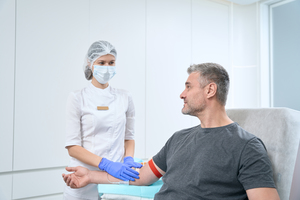Find Hepatitis test
in Toledo, OH.
Own a clinic? Add your location.
Help patients book appointments with you on Solv. It's free!
1 instant-book location

Mercy Health Urgent Care, Temperance
Mercy Health Urgent Care

MedPro Primary, New Boston
MedPro Primary
Lambertville Urgent Care & Walk-in Clinic
Lambertville Urgent Care & Walk-in Clinic
ProMedica After Hours
ProMedica After Hours
Dundee Welcome Center (US-23)
Dundee Welcome Center (US-23)
Own a clinic? Add your location.
Help patients book appointments with you on Solv. It's free!
About Hepatitis test
Who should get tested for hepatitis?
Anyone who has been exposed to the virus should get tested for hepatitis. This includes those who have shared needles or other drug paraphernalia, had unprotected sex, received a tattoo or piercing with unsterilized tools, or traveled to countries where hepatitis is common. Additionally, individuals born between 1945 and 1965, also known as baby boomers, are five times more likely to have hepatitis C and should get tested according to the CDC.
Importance of getting tested
Getting tested for hepatitis is crucial as it helps to prevent the spread of the disease and allows for early treatment. Early detection can prevent serious liver damage, including cirrhosis and liver cancer, which can result from chronic hepatitis infection. According to the CDC, many people with hepatitis do not have symptoms and do not know they are infected, hence the importance of regular testing.
Hepatitis testing options in Toledo, OH:
Urgent care and walk-in clinics
Urgent care centers such as Michigan Urgent Care in nearby Dundee, MI provide hepatitis testing. These facilities often offer same-day and next-day appointments, which can be conveniently booked through Solv’s website and mobile app.
Primary care providers
Primary care providers are another option for hepatitis testing. They can provide ongoing care and treatment if you test positive for the virus.
Free STD testing and community health centers
In Toledo, there are community health centers that offer free or low-cost hepatitis testing. These centers are a great resource for those without insurance or with limited financial resources.
At-home testing
At-home testing kits are also available for those who prefer privacy. These kits can be purchased online or at a local pharmacy.
Prevalence of hepatitis in Toledo
In Lucas County, where Toledo is located, hepatitis cases have been reported. However, the exact prevalence is unknown as many people with hepatitis are unaware of their infection. Comparatively, the prevalence of hepatitis in Toledo is similar to nearby counties such as Chautauqua County and Beaver County.
Risk factors related to hepatitis in Toledo
Risk factors for hepatitis in Toledo include unprotected sex, drug use, and travel to countries where hepatitis is common. Additionally, individuals with certain medical conditions, such as HIV, are at an increased risk.
Other STDs in Toledo
In addition to hepatitis, other STDs such as gonorrhea, chlamydia, HIV, and syphilis are also prevalent in Toledo. Regular testing for all STDs/STIs is recommended for those who are sexually active and at risk.
Solv has strict sourcing guidelines and relies on peer-reviewed studies, academic research institutions, and medical associations. We avoid using tertiary references.
Related Searches
STD Testing in Toledo, OH
Flu Test in Toledo, OH
Sports Physicals in Toledo, OH
Lab Tests in Toledo, OH
Urinalysis in Toledo, OH
COVID-19 Testing in Toledo, OH
H Pylori Test in Toledo, OH
Mono Test in Toledo, OH
Glucose Test in Toledo, OH
Ear Wax Removal in Toledo, OH
Dermatologists in Toledo, OH
Cholesterol Test in Toledo, OH
Allergy Testing in Toledo, OH
DOT Exam in Toledo, OH
Diabetes Test in Toledo, OH
Basic Metabolic Panel in Toledo, OH
Strep Test in Toledo, OH
Blood Test in Toledo, OH
Drug Test in Toledo, OH
RSV Test in Toledo, OH
Diagnostic Test in Toledo, OH
A1C Test in Toledo, OH
Thyroid Test in Toledo, OH
Pulmonary Function Test in Toledo, OH
Pregnancy Test in Toledo, OH
DNA Test in Toledo, OH
Urgent Care in Toledo, OH
TB Test in Toledo, OH
CMP Test in Toledo, OH
Vitamin D Test in Toledo, OH
COVID-19 Pill in Toledo, OH
Pediatric Urgent Care in Toledo, OH
Aetna Urgent Care
Blue Cross Blue Shield Urgent Care
Cigna Urgent Care
COVID-19
Flu
United Health Urgent Care
» All services in Toledo, OHFind hepatitis test
Nearby cities
Everyday Healthcare, Simplified
Expert advice to help you live your best life







